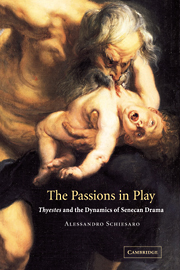6 - The poetics of passions
Published online by Cambridge University Press: 22 September 2009
Summary
INTERTEXTUALITY AND ITS DISCONTENTS
The thematic insistence on the role of the past in the tragedies is displayed to great effect in the extensive and for some even hypertrophic allusive dimension of Seneca's writing. I now want to explore this dimension of intertextuality further. By problematizing the relationship between intertextuality, poetry and the past, I also want to look again at the connection between poetry and passions, and at what implications such connections might suggest for the interpretation of Thyestes and other plays. In the second section of this chapter I will therefore focus again on the Stoics' theoretical discussion of the role of the audience confronted by theatrical outbursts of passion, and in the third section I will investigate how spectatorship is dealt with in the tragedies themselves. The last portion of this chapter will be devoted to an issue which is crucial both within the tragedies and in the possible modalities of their reception, that is, the relationship between this form of drama and epic. I will also look further at possible analogies between Seneca's plays and modern ‘epic drama’, which may be characterized by the particular mode of reception it demands and purports to foster. Can Seneca's theatre be considered ‘epic’ in any Brechtian sense? Was his notional audience predicated on a similar set of presuppositions?
Intertextuality is indeed one way of looking back, of allowing a past constituted by texts, words and narratives to shape the present and possibly the future.
- Type
- Chapter
- Information
- The Passions in PlayThyestes and the Dynamics of Senecan Drama, pp. 221 - 251Publisher: Cambridge University PressPrint publication year: 2003



